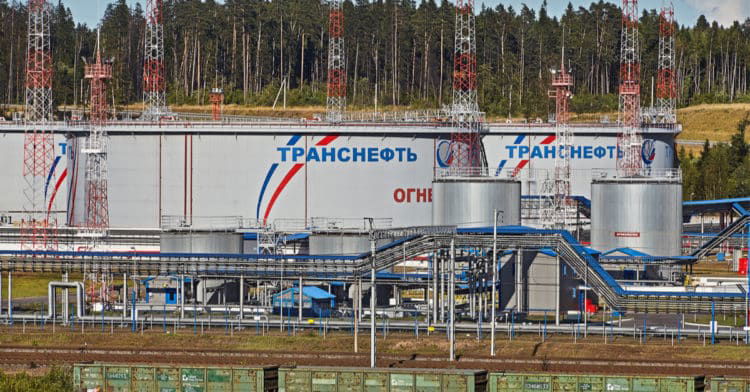Europe could simply buy fewer fossil fuels from Russia, maybe more from elsewhere—but there is a more fundamental answer.

The second largest global oil exporter is waging war and everyone seems to have been caught napping. Weeks passed after the missiles started to rain down on Ukrainians before sanctions on Russia’s fossil fuels were discussed, exposing fractures in the European response.
While the British prime minister, Boris Johnsion, argued that ‘we need to get ourselves off that addiction’, just how to sever the hand that feeds—now dripping in Ukrainian blood—is a question no one seems able to answer without compromising on the universal norms so vital to global peace. And while thousands of Ukrainians huddle underground from bombardment and many more seek shelter in foreign lands, the price of oil continues to rise—in a very short time reaching almost $130.
Unlike in previous wars, with their ramifications for oil prices, each day however we approach the cusp of an existential crisis made possible by burning oil, gas and coal for economic prosperity. Yet the impacts of climate change—from heatwaves and drought to floods and rising sea levels—are often bracketed out of the ‘What is to be done with Russia?’ debate.
As the price of a commodity increases, demand decreases. Last year, when oil was cheaper, according to the International Energy Agency, global energy-related carbon-dioxide emissions rose by 6 per cent to 36.3 billion tonnes, the highest ever.
So the world stands to lose much if the United States president, Joe Biden, succeeds in securing greater oil output from Saudi Arabia, the largest exporter. (Not forgetting that a then United Nations special rapporteur, now Amnesty International leader, Agnès Callamard, concluded that Riyadh had been responsible for the 2018 ‘extrajudicial killing‘ of the Saudi dissident Jamal Khashoggi.)
Just two years ago most developed countries created economic rescue packages in response to Covid-19. With little debate, trillions were committed to stop a virus from collapsing capitalism. In similar vein, trillions must now be put into massively scaling up renewable-energy generation.
The technology has long proven adequate: the sun and wind are waiting to be fully tapped, while it is past time for the oil tap to be shut. Funding the transition would create jobs and stimulate growth, while addressing the climate crisis. It is the short- as well as long-term solution to Russia’s tainted fossil fuels.
Virtually dependent
Oil may be a quintessential global commodity but its shortage affects Europe and the US differently. With the latter responsible for only 8 per cent of Russian oil imports, Biden had little to lose from banning it from American cars. But with so much fossil fuel flowing from Russia to the European Union and the continent’s economic powerhouse virtually dependent on it for its energy, Europeans have more to worry about.
Should Europe continue buying oil which Ukraine’s foreign minister, Dmytro Kuleba, said ‘smells of Ukrainian blood’? ‘While we condemn Russia’s armed offensive and we also condemn the war, we will not allow Hungarian families to be made to pay the price,’ the Hungarian prime minister, Viktor Orbán, insisted. And the German finance minister, Christian Lindner, was blunt: ‘We should not limit our ability to sustain ourselves,’ he told the tabloid Bild. The European Commission president, Ursula von der Leyen, however urged: ‘We must become independent from Russian oil, coal and gas. We simply cannot rely on a supplier who explicitly threatens us.’
The war is straining European solidarity but the political choice is not between reducing Russian oil, coal and gas—and replacing it with other sources of fossil fuels—or allowing its full flow to continue. The right option is to rapidly increase and sustain public investments in renewable energy, to send factories spouting forth solar panels to dot the rooftops of European homes. It is to democratise and socialise European energy generation, giving greater control to ordinary people who are weeping at the wanton waste of life in Ukraine. The right choice will uncompromisingly uphold those liberal values which the Russian president, Vladimir Putin, deems ‘obsolete’.
Not fit for purpose
Fully 90 per cent of gas consumed in the EU, 27 per cent of oil and 46 per cent of coal come from Russia. In response to the war, the commission has taken a step towards European energy independence. Unfortunately, its REPowerEU is not fit for purpose.
It is premised on the familiar market mantra about demand and supply—making the category error of treating energy as a commodity rather than a public good—which has failed to stimulate the necessary vertiginous growth in renewable-energy output. This though the commission fully accepts that ‘the case for a rapid clean energy transition has never been stronger and clearer’.
REPowerEU could potentially ‘empower consumers’ but not by ‘tapping into the potential of demand-side flexibility to respond to fluctuations in demand and supply’. Brussels must use this crisis as an opportunity to take revolutionary decisions by substantially increasing public funding for renewable energy. It can no longer wait for the private sector to lead Europe’s energy independence.
Democratic and decentralised
This war has cast in a stark spotlight the speed with which such funds must be more democratically disbursed, to develop a more decentralised European energy infrastructure that is more public. This is a faster route to energy independence than searching for new sources of oil, coal and gas. It will also allow citizens to produce energy. A decentralised energy infrastructure makes sense as a defence and economic policy—not just ecologically.
An unfortunate truth is that there will be another war and that it too will more than likely inflate the price of oil. The unfolding climate catastrophes, uncertainties about the course of this war and the lessons learnt from it about Europe’s vulnerability are sufficient inducements to take decisions on Russian fossil fuels that cleanse consciences, secure energy independence and mitigate climate disasters.
Michael Davies-Venn is a public-policy analyst and political-communications expert, based in Berlin, focused on issues of global governance, including climate change and human rights. He is a guest researcher in the Ethics of the Anthropocene Programme at Vrije Universiteit Amsterdam.

